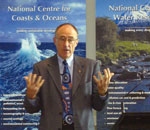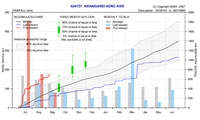PDF of this article (90 KB)

Coastal effects workshop a success
A workshop on the 'Effects of land-based activities on the coastal environment', hosted jointly by NIWA’s National Centre for Coasts and Oceans and National Centre for Water Resources, has generated considerable interest and enthusiasm. Held at Te Papa in Wellington in early May, the two-day meeting brought together almost 100 participants, including policy makers, industry sector groups, regional and local authorities, iwi authorities, and a wide range of science disciplines. The workshop was timely, since a number of important strands converge around the issue; these include a preliminary Parliamentary Commission for the Environment study of coastal seas and estuaries, review of the New Zealand Coastal Policy Statement, revitalisation of Oceans Policy, and the progression of environmental science from observation to prediction.

Dr Morgan Williams, Parliamentary Commissioner for the Environment, was the keynote speaker. He emphasised that, although New Zealanders increasingly want a pristine coastal environment, our economy is dominated by a large metropolis that impinges on surrounding harbours, and an agricultural sector reliant on nitrate application. He observed that future global demand for protein-rich foods, like aquaculture products, will only increase, with the associated requirement for unpolluted coastal waters for marine farming.
Other speakers on the first day highlighted the need to integrate such environmental issues into a holistic ecosystem view, so that, for example, diverging views and needs of the agricultural and marine farming sectors can be assessed. Though New Zealand aquaculture production relies on access to clean, nutrient-rich waters, most are affected in some way by land-sourced pollution that can limit harvesting.
The second day comprised a series of technical presentations showing science advances in understanding the source and generation of land-based 'pollutants', and subsequent transfer and attenuation within the catchment, before ultimate dispersal at the coast. These pollutants can range from muddy sediment run-off to heavy-metal contaminants, faecal coliforms, fertiliser nitrate, or cyanotoxins. Presentations also showed that the results of such land-based pollutants can be varied, including changes in nearshore habitat structure and ecosystem function, and negative effects on nursery grounds for coastal fisheries.
Recommendations from the workshop were clear:
- ecosystem rather than jurisdictional management
- development of coastal environment classification
- wider recognition that land use affects coastal ecosystems
- greater recognition of coastal water quality in resource-management decisions
- more environmental monitoring in the coastal zone
- better prediction of the cumulative effect of future land-use scenarios on the coastal environment
- better communication networks between scientists, resource managers, and community groups.
The presentations from the workshop are available as PDFs from www.niwascience.co.nz/ncco/workshops/#effects
For further information, contact: Dr Ian Wright, 0-4-386 0322, [email protected] Dr Jim Cooke, 0-7-856 1744, [email protected]
Communities learning to work with the sea

In April, NIWA, AgResearch, and GNS Science organised a workshop in Lower Hutt that addressed 'Community participation in coastal hazard mitigation'. The goal was to provide attendees with the tools to facilitate successful outcomes for community groups. The 20 participants were staff from district and regional councils, Civil Defence and Emergency Management (CDEM), and crown research institutes who are involved in resource management and management of coastal natural hazards.
The key players in resolving hazard management issues at the community level are community groups, regulatory authorities, and technical experts. Participants were introduced to the theory of why community groups form and how they operate and survive. They worked their way through case studies, debated the interactions between the key players, and identified the key elements of achieving positive outcomes. They also had the opportunity to examine their personal experiences within this framework. Greg Jenks of Environment Bay of Plenty and Jim Dahm of EcoNomos recounted experiences from the practitioner’s viewpoint.
Much of the course content and case studies came from a research project being undertaken by GNS Science, NIWA, AgResearch, and EcoNomos in the FRST programme 'Geological Hazards and Society'. A similar workshop will be organised in 2007, possibly in Christchurch.
For further information, contact: Dr Terry Hume, 0-7-856 1729, [email protected]
